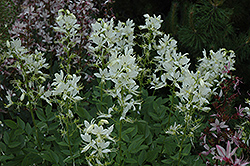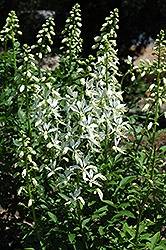Albiflorus Gas Plant
Dictamnus albus 'Albiflorus'
Plant Height: 24 inches
Flower Height: 3 feet
Spacing: 24 inches
Sunlight:
![]()
![]()
Hardiness Zone: 3
Other Names: Dittany, Burning Bush
Brand: Walters Gardens
Description:
This variety produces stunning clumps of pure white flower spikes from late spring to early summer, above rich green, aromatic foliage; may take a few seasons to reach blooming maturity; impressive when massed in the garden or border
Ornamental Features
Albiflorus Gas Plant has masses of beautiful spikes of lightly-scented white flowers rising above the foliage from late spring to mid summer, which are most effective when planted in groupings. Its fragrant pointy pinnately compound leaves remain forest green in colour throughout the season. It produces brown capsules from late summer to mid fall.
Landscape Attributes
Albiflorus Gas Plant is an herbaceous perennial with an upright spreading habit of growth. Its medium texture blends into the garden, but can always be balanced by a couple of finer or coarser plants for an effective composition.
This is a relatively low maintenance plant, and is best cleaned up in early spring before it resumes active growth for the season. It is a good choice for attracting birds, bees and butterflies to your yard, but is not particularly attractive to deer who tend to leave it alone in favor of tastier treats. It has no significant negative characteristics.
Albiflorus Gas Plant is recommended for the following landscape applications;
- Mass Planting
- General Garden Use
- Naturalizing And Woodland Gardens
Planting & Growing
Albiflorus Gas Plant will grow to be about 24 inches tall at maturity extending to 3 feet tall with the flowers, with a spread of 24 inches. When grown in masses or used as a bedding plant, individual plants should be spaced approximately 24 inches apart. It grows at a slow rate, and under ideal conditions can be expected to live for approximately 20 years. As an herbaceous perennial, this plant will usually die back to the crown each winter, and will regrow from the base each spring. Be careful not to disturb the crown in late winter when it may not be readily seen!
This plant does best in full sun to partial shade. It is very adaptable to both dry and moist locations, and should do just fine under typical garden conditions. It is not particular as to soil type or pH. It is somewhat tolerant of urban pollution. This is a selected variety of a species not originally from North America, and parts of it are known to be toxic to humans and animals, so care should be exercised in planting it around children and pets.; however, as a cultivated variety, be aware that it may be subject to certain restrictions or prohibitions on propagation.

